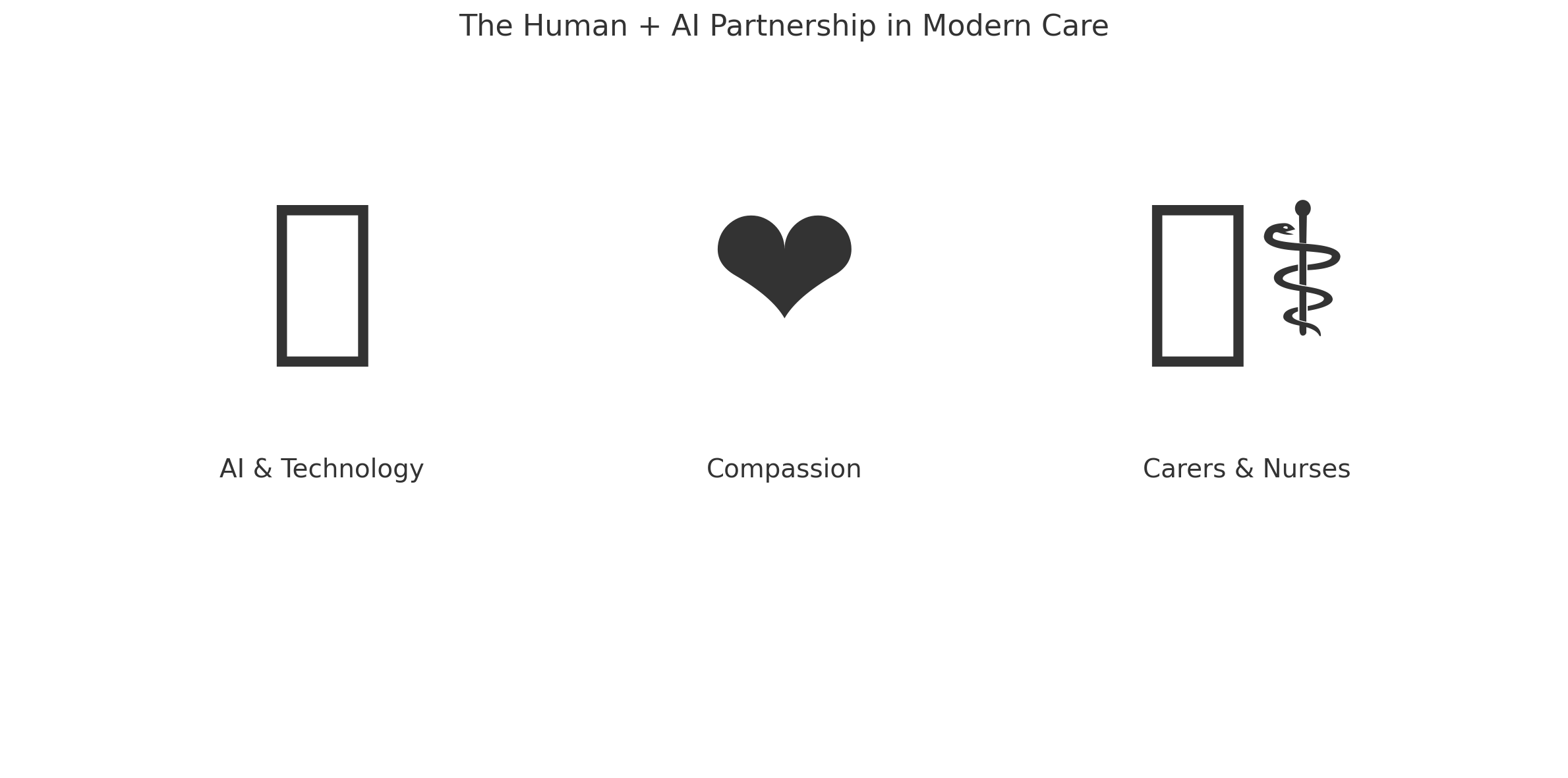The UK care sector is evolving — and at the heart of this transformation is a growing alliance between human compassion and artificial intelligence. Far from replacing nurses or carers, AI is already enhancing the way we deliver care, streamlining tasks, improving safety, and making room for more personalised, dignified support.
At CareStaff24, we understand that the future of care isn’t just about people — it’s about people empowered by technology. Let’s explore how AI is already being used in care and what lies ahead for professionals and clients alike.
The Rise of Smart Care
AI isn’t science fiction anymore — it’s a practical part of many modern care settings. From intelligent scheduling tools to wearable health monitors, artificial intelligence is quietly supporting nurses and carers behind the scenes.
This shift is especially important in a time where demand for care is rising, yet the workforce is stretched. AI is helping to bridge that gap — enabling carers to do what they do best: deliver compassionate, human-centred care.

AI Tools Already in Use Across UK Care Services
Here are just a few examples of AI already making a difference in nursing and care environments:
1. Digital Rota Management & Predictive Scheduling
AI systems help care providers like CareStaff24 create rotas that adapt to staff availability, client needs, and geographic locations — reducing missed visits and improving work-life balance for carers.
2. Smart Medication Reminders
AI-powered apps and devices can monitor medication schedules, send alerts, and even flag inconsistencies — giving both carers and clients peace of mind.
3. Wearables for Health Monitoring
Smart watches and wearable trackers can monitor vital signs, activity levels, and even detect falls. This real-time data can alert carers or nurses before a situation becomes critical.
4. AI-Assisted Documentation
Speech-to-text and AI-driven note-taking tools are helping reduce the administrative load — meaning carers spend less time filling in forms and more time with people.
How AI Supports Carers and Nurses
Technology can never replace the intuition and empathy of a human carer. But it can support those skills — helping professionals work smarter, not harder.
- Faster decision-making: AI can identify health risks early, using data to guide interventions
- Reduced burnout: Automating admin tasks frees up carers for face-to-face time
- Improved accuracy: Digital documentation tools reduce the risk of errors or missed tasks
- Training and upskilling: AI can offer adaptive learning platforms, helping carers stay ahead with tailored modules
- The end result? Safer care, happier teams, and better outcomes.
For Clients: More Dignity, More Independence
Clients and their families are already seeing the benefits of AI-enabled care — often without realising it.
- Smart home integration allows older adults to live independently longer. Voice-activated reminders, automated lighting, and health tracking systems provide discreet support
- Fall detection technology ensures quicker response times when accidents occur
- Companion bots and virtual assistants are beginning to offer emotional support, reminders, and cognitive stimulation — particularly for those with dementia
- AI doesn’t remove the human connection — it makes it stronger, by giving carers more capacity to focus on emotional and social support.

What the Future Holds for AI in Care
As we look beyond 2025, here’s how AI is expected to further reshape nursing and homecare in the UK:
1. Predictive Healthcare
AI algorithms will help anticipate changes in a person’s condition — from early signs of infection to changes in mobility or cognitive health. This means more proactive care and fewer hospital visits.
2. AI Companions
We’re already seeing robotic pets and virtual companions being used for those living with dementia. These tools can help reduce anxiety, stimulate memory, and provide comfort.
3. Mobility Support Robots
In some settings, robots are assisting with transfers, mobility, and repetitive physical tasks — reducing injury risk for carers and empowering clients.
4. Voice-Based AI for Mental Health
Voice analysis AI is being developed to detect mood changes and early signs of depression — opening up new frontiers in emotional support for clients receiving long-term care.
5. Human-AI Hybrid Teams
In the future, care teams may include a blend of carers, nurses, and AI assistants — each playing a role in creating a holistic, responsive support system.
The Ethical Side of AI in Care
As with any technology, balance is essential.
While AI offers exciting possibilities, it must be used ethically, with clear boundaries around data, consent, and human oversight. At CareStaff24, we believe technology should always serve humanity, not replace it.
AI should be a tool for compassion — not a substitute for it.
Training, transparency, and client-centred design will be vital to ensuring AI enhances care without compromising trust or dignity.
Embracing the Future Together
AI is not just a buzzword — it’s already supporting carers, nurses, and healthcare organisations across the UK. From improving scheduling to enabling safer, more responsive care, these tools are quietly revolutionising the sector.
But the real power lies in the partnership between people and technology.
At CareStaff24, we’re excited about what the future holds — and we’re committed to embracing innovation without losing the human touch that makes care truly meaningful.
Want to Work at the Forefront of Modern Care?
Whether you’re a tech-curious carer or a nurse passionate about innovation, CareStaff24 is the place to grow. Join a team that values forward-thinking care, ongoing learning, and real human connection.
Explore roles / Contact us today
Together, let’s shape the future of care — one intelligent act of kindness at a time.

Your care, your future! We’re here to support both.
At CareStaff24, we’re proud to connect compassionate professionals with meaningful opportunities across East Sussex and beyond. Each job listing reflects our commitment to safer staffing, responsive recruitment, and personalised support.
All applicants are thoroughly vetted, supported through every step, and matched with roles suited to their skills, preferences, and availability. If you have questions about a role or need help applying, our friendly team is just a message away.
Let’s find the right opportunity, together.

